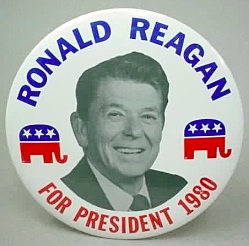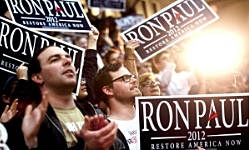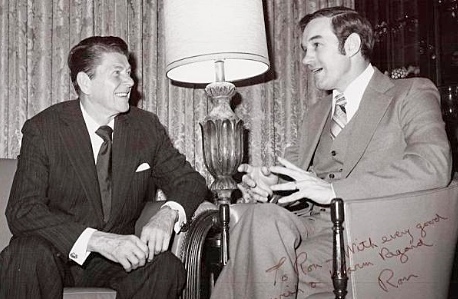During the 1964 presidential campaign, an actor named Ronald Reagan got seriously involved in politics for the first time by endorsing Republican Barry Goldwater. Nobody knew then that Reagan would be elected himself just 16 years later.
The ’64 campaign was a polarizing one, because Goldwater and his supporters were the hard-core, rabid conservatives. They beat back moderate elements of the GOP to win the nomination. Goldwater talked about liberty and cutting the size of government. He even suggested making Social Security voluntary. His campaign slogan was, “In your heart, you know he’s right.” His Democratic opponent, President Lyndon Johnson, painted Goldwater as an extremist, mocking him with, “In your guts, you know he’s nuts.” Johnson also hit Goldwater with one of the earliest television attack ads.
The election was a disaster for Goldwater. He carried only six states. But his campaign was the beginning of a growing conservative movement that would expand and organize itself into something capable of completely taking over the Republican Party and propelling Reagan to the White House in 1980. The Goldwater campaign was the first part of the long process of switching the Solid South from Democrat to Republican. So much of what became the so-called Reagan Revolution never could have happened if the Goldwater campaign hadn’t happened in 1964.
I’ve been thinking about Goldwater and Reagan because I’m trying to project what effect Ron Paul is eventually going to have on the Republican Party or on U.S. politics. Only the most stubborn Paul supporter could possibly still claim that he has any chance of winning the nomination this year, much less being elected president, but it’s clear he’s energized a group of rabid, hard-core libertarians. At the polls, he’s going to lose badly. But will his influence come far down the road, as was the case for Goldwater?
That’s my suspicion. I suspect that a core of people who came through the Paul campaign will stick around in the Republican Party and pull parts of it — in some states — more in the libertarian direction. If they’re able to keep growing and organizing, they’ll eventually find a candidate who they can get elected. He won’t be as pure libertarian as Paul is, but he’ll be close enough. And when that happens, they’re going to call it a revolution of some sort — just as Reagan’s eight years in office came to be called the Reagan Revolution.
So will that make all the time, money and effort spent on Paul’s campaigns — and the ones that come after this — worth it? Some people would say, “Yes.” I say, “No.” Here’s why.
 What did the Reagan Revolution accomplish? Absolutely nothing. If you look at the facts — instead of listening to fuzzy memories of those who loved Reagan at the time — you see that government grew hugely on his watch. He didn’t dismantle the departments (education and energy) that he promised to abolish. He didn’t do much of anything that he promised. If you were a cold warrior, you liked his stance toward the Soviet Union for the most part, but people who’ve looked at the real state of the Soviet economy (after the fact) say the Soviet system would have collapsed anyway. It’s a myth that Reagan was responsible.
What did the Reagan Revolution accomplish? Absolutely nothing. If you look at the facts — instead of listening to fuzzy memories of those who loved Reagan at the time — you see that government grew hugely on his watch. He didn’t dismantle the departments (education and energy) that he promised to abolish. He didn’t do much of anything that he promised. If you were a cold warrior, you liked his stance toward the Soviet Union for the most part, but people who’ve looked at the real state of the Soviet economy (after the fact) say the Soviet system would have collapsed anyway. It’s a myth that Reagan was responsible.
Just months after Reagan left office, Murray Rothbard wrote a stinging article analyzing his eight years as president. Rothbard laid out a very strong case that Reagan accomplished nothing and that the country continued getting worse, despite Reagan’s rhetoric. (I strongly urge you to read the whole article.) He said Reagan had libertarian rhetoric, but statist policies. Rothbard wrote:
There was no “Reagan Revolution.” Any “revolution” in the direction of liberty (in Ronnie’s words “to get government off our backs”) would reduce the total level of government spending. And that means reduce in absolute terms, not as proportion of the gross national product, or corrected for inflation, or anything else. There is no divine commandment that the federal government must always be at least as great a proportion of the national product as it was in 1980. If the government was a monstrous swollen Leviathan in 1980, as libertarians were surely convinced, as the inchoate American masses were apparently convinced and as Reagan and his cadre claimed to believe, then cutting government spending was in order. At the very least, federal government spending should have been frozen, in absolute terms, so that the rest of the economy would be allowed to grow in contrast. Instead, Ronald Reagan cut nothing, even in the heady first year, 1981.
And this, my friends, is what I expect from whatever watered-down, sorta, halfway libertarian the descendants of the Ron Paul movement manage to get elected one day. Even if he talks a good game and says all the right things, you can’t change the coercive state. You can nibble away around the edges at times and claim huge victories when your wins are really symbolic. But the Leviathan from 1980 is bigger than ever in 2012 and it’s going to be bigger than ever when this future theoretical candidate is elected — and it’s going to be even bigger when he leaves office.
The core of the issue is that you can’t simply prune a bit off the state. You have to kill the beast. The whole idea that some people have the right to tell others what to do and how to live is what must die. As long as you accept the legitimacy of the state and try to tame it and make it smaller, you’re feeding it. The beast will be happy to nod its head and pretend to agree with you when it suits its purpose, but it will go right back to being the beast.
I’ve talked before about my ideological journey from being a good little patriotic boy who believed all the right mainstream things to becoming a libertarian — the minarchist version. It’s easier to make that leap, because you don’t have to reject everything you’ve grown up believing. You can still hold onto the fantasy that the government can work for us. You can hold onto the fantasy that if we’ll just talk to enough people, everybody will go back to obeying the Constitution as it was written. (Was there ever a time in U.S. history when that was true?) So I understand the allure of believing the beast can be tamed. I just know now that it’s a fantasy.
You can draw a direct line from the 1964 campaign of Barry Goldwater to the 1980 election of Ronald Reagan. You just can’t show that there was anything accomplished by the expenditure of all that time, money and effort. In the same way, I think you’re one day going to be able to draw a direct line from the campaigns of Ron Paul to the election of some future president (as long as the country doesn’t collapse first). In the same way, though, I believe it will be a hollow victory, because it won’t accomplish any more of lasting value than Reagan’s presidency did.
In Rothbard’s article, he talks about being frustrated with the responses he got from people he talked to about Reagan:
Very often I would be at free-market gatherings, from living rooms to conferences, and I would go on and on about the deficiencies of Reagan’s policies and person, and would be met with responses like “Well of course, he’s not a PhD.”
Me: “No, no, that’s not the point. The man is a blithering idiot. He makes Warren Harding tower like Aristotle.”
Responder: “Ronald Reagan has made us feel good about America.”
When you get right down to it, I think the same thing is going on today. Many of us look at the state and realize that it’s an absolute waste of time, money and effort to try to get a president elected. It’s so obvious to some of us that it’s hard to believe that everyone doesn’t see. But to others, the view is very different. They hear the hopeful language from Ron Paul and they somehow believe that things can change — somehow. They might not be able to refute the logical reasons why it’s not going to happen that way, but they still believe.
 Ultimately, I think the Paul supporters are essentially saying the same thing the Reagan supporters were saying: “Ron Paul has made us feel good about America.”
Ultimately, I think the Paul supporters are essentially saying the same thing the Reagan supporters were saying: “Ron Paul has made us feel good about America.”
If what you really want is that feeling, then you’re getting what you want out of your political involvement. I think that feeling — and the hope that comes with it — has been enough to get people to commit a lot of time, money and effort to a battle that can’t and won’t be won. It’s certainly their right to fight it, but a look at the history of the Reagan Revolution — the revolution in name, but not in fact — should lead one to conclude that the same thing is going to happen this time. If all you want is to feel better, politics might work for you. But if you want real change, it’s not the answer.
The coercive state isn’t the answer. Any plan to change the government by becoming the government is doomed to fail. You don’t shut down a criminal enterprise by campaigning to take over as boss. You shut it down instead.

 The Alien Observer podcast heads to Planet Earth in weeks to come
The Alien Observer podcast heads to Planet Earth in weeks to come Nothing new here: Russell Brand pushing same old socialist idiocy
Nothing new here: Russell Brand pushing same old socialist idiocy Egypt trying to prove democracy means tyranny of the majority
Egypt trying to prove democracy means tyranny of the majority